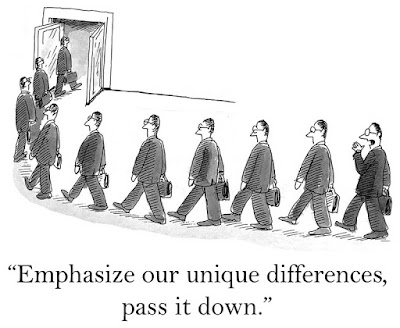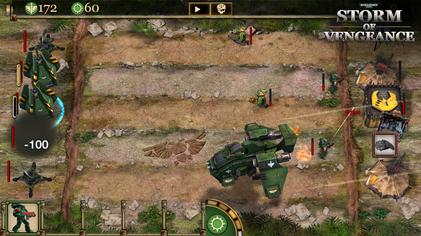With all of my preparations for Gencon, and general busy-ness elsewhere, I completely missed when GW released its financials for the year. If you were expecting any sort of big surprise on the financial end, you'll be disappointed. Sales & profits are down a bit (like each of the last few years), and dividends were cut. So you know... Same old same old. Nothing has changed in the long-term trends. Sales are up a little bit in North America & Asia, and down everywhere else. Royalties are back up (covering some for weak sales), and they've somehow found more operational expenses to cut to slightly increase their Operating Profit. Yawn...
The most entertaining bits though, as always, are in the chairman's introductions.
Now, GW was a bit sneaky, and their Investor Relations Page actually has two links to very similar-looking "Annual Reports"; both dated July 25th. But the first link is just a press statement that looks like a full report, while the second is the actual full report with more interesting ramblings from Tom Kirby, GW's current
Here's the gist of it (from the actual report):
There's Trouble With The Board
"The board spent a day recently debating the fact that many proxy votes were cast against it. They were mostly aimed at the remuneration policy (a very fashionable topic these days), the non-executive directors who have served ‘too long’ and, me, the chairman on numerous counts."So some institutional investors have raised concerns that reached the board (and thus had to be addressed), but the board was able to mostly ignore them. Kirby goes on to defend what he thinks defines an effective board looks like, and how they measure their effectiveness.
"We do all these and take every point very seriously. We comply. The line where some will disagree with us is this one: creates a performance culture that drives value creation without exposing the company to excessive risk of value destruction. We do not have LTIPs or any bonus schemes for senior management. We do have payment schemes designed to encourage store managers to sell more, and we have a company wide scheme that allows all employees to share in profitable growth. It rewards ALL employees not just the chosen few. Both schemes are designed to enhance value. LTIPs and bonuses for senior staff are deemed to be necessary by some to encourage value creation, but more, to ensure longevity of staff and help with succession planning. These are not needed at Games Workshop4. Our executive directors both have around 20 years service with the company. Their likely replacements have been here a similar length of time (well over 10 years). And, yes, they will be internal appointments. In fact, we see 10 years as the running-in period. I suspect these schemes are needed in businesses that have an eternal merry-go-round of executives who appear and disappear with monotonous regularity. They are not needed at Games Workshop, and I trust they never will be. Furthermore I believe they are fundamentally self-serving and disastrously value destroying. Nothing leaves a sourer taste in the mouth than executives lining their own pockets and claiming it is for the long term good of the business before moving on to their next golden handshake clutching their golden parachute."That sounds good and all, but what about Tom Kirby and his large stock holdings? Isn't he just waiting to retire with his golden parachute?
Anyhow, my take-away is that the institutional investors want to see some new blood on the board, and GW is doing its best to avoid any kind of external hire that might upset the status quo of their slow downward spiral into irrelevance. They only want to hire internal people who are so wedded to GW's way of doing things that they haven't jumped ship yet.
It continues...
"An effective board should not necessarily be a comfortable place. Challenge, as well as teamwork, is an essential feature. Diversity in board composition is an important driver of a board’s effectiveness, creating a breadth of perspective among directors, and breaking down a tendency towards ‘group think’.
We believe we do comply with the intent of this paragraph, whilst acknowledging some may think we do not.
We fully agree that ‘group think’ is a bad thing. We fully agree that challenge is an essential ingredient in an effective board, as is teamwork. We do not agree that diversity for its own sake is the answer. We believe that each director must be independent of mind. To imply that someone is not independent minded because of time served or sex or ethnicity or religion or whatever else is false."Now this is an interesting exchange. The institutional investors are asking for more "diversity" on the board. But how is "diversity" defined in their context? Kirby (or his writer) makes a very eloquent statement about how independence of mind is more important than sex/ethnicity/whatever, but is he just dodging a request for more independence in THINKING by re-framing the request in the politically-correct context of only race/sex?
"Only independence of mind counts. There are no proxies, no quotas that get around it. Rubbish directors are rubbish directors. The fact that they allow boxes to be ticked on arcane lists doesn’t make them effective. Good, independent minded directors are as hens’ teeth, gold dust. We have six. Including me."So Mr. Kirby... How might this "Independence of Mind", assuming your board has any, present itself? Might it not manifest in changes to how your company operates?
Wouldn't a board with some fresh perspectives see opportunities where your cloistered group currently sees only threats? Such as with 3rd party garage plastics and 3D printing, which you've decided to fight with legal actions instead of co-opting into new business opportunities?
Might not a board with an independence of mind see the slow decline of GW as a bad thing, and investigate the benefits of bringing your "high quality" production capabilities to things like well-written game rules and ready-to-play miniatures/terrain and 3D printed bitz that would capture new customers?
You've pretty much maxed out the quality of your plastic molds, and have achieved levels of detail in your models that are, if anything, starting to be intimidating (rather than inspiring) to your average hobbyist. Can you develop a machine that will assemble and paint a simple mini to a minimum tabletop standard? That would be an evolution in quality that would attract MANY more customers.
"The IP Play"
"Over the years we have been exhorted by some to develop our revenue stream by ‘leveraging’ our IP. Using our great imagery we could do all sorts of lucrative and exciting value-enhancing (i.e. take private and re-float) deals. Actually, what they really mean is: do a movie!Yeah, because Marvel did some movies and they flopped so horribly that... Oh wait, Disney ended up buying them because even the so-so ones are fantastically profitable!
We have never NOT done licensing deals, as you can see from the steady stream of royalties we earn; it’s just that we believe we must do them on our terms and not prostitute the business to any and every deal that comes along. If we do a movie (along with the concomitant abandonment of the toy rights6) it will be on terms that do not compromise our business. It isn’t likely.And how exactly would selling the rights to a movie company to make 40K movies, and earning a nice revenue stream from their productions (as well as more publicity for your games) be a bad thing? You micro-managed that one movie you did on the cheap, and it was garbage.
Long term owners will notice a big increase in royalty income this year. Have we sold out at last? No, it’s just that working closely with the myriad app developers, and being more precise with the terms we offer, we have increased the number of ‘computer’ games in the market."Um...
Ok, maybe that's not fair, since that PoS came out in 2014. But what about this abomination...
This one was released just yesterday and is already being marked down by Steam.
But I guess you guys have never actually played a good game like Shadow of Mordor...
And that's only a very early development trailer. The actual game looked and played much better.
And then there's Alien:Isolation, which better captures the feel of sci-fi horror that an Eisenhorn game should have. Because I've read the books, and that game that you licensed doesn't feel at all like them. But maybe that's because Dan Abnett was the writer on Alien:Isolation. :)
Also notice how hard it is to kill enemies in both games (go to the YouTube page for the A:I walkthrough and look at the Android encounters).
The main character in Shadow of Mordor is pretty powered up in that sample above, and it's still no easy thing to jump into an group of Orks and take them out. You have to block blows, stun a guy, turn around, block a few more hits while getting in a few jabs, and only when your sword is powered up by a chain of hits can you actually dispatch a grunt with a single blow. Otherwise you'll be hacking on them for 5-10 minutes if they don't overwhelm you first by calling in reinforcements.
So maybe part of increasing your board's mental diversity might include hiring someone with a video game background to ensure that you're making deals with quality studios, and that the final product isn't a PoS? Because while there have been some good 40K/WHFB games over the years, the duds far outnumber the successes. Meaning that unlike a Marvel movie or a licensed Lego game, your audience doesn't automatically trust that they'll get something worth the money they're paying for it.
Strategic Report
"Games Workshop's ambitions remain clear: to make the best fantasy miniatures in the world and sell them globally at a profit, and it intends doing so forever. This statement includes all the key elements of what we do and why we do it that way. All of our decision making is focussed on the long term success of Games Workshop, not short term gains."
So where is the long-term success? Where is the growth in customers, sales, and profit that at least beats the rate of inflation? Because I'm not seeing it!
This is not the 1980's and 1990's anymore. Having "The Best" miniatures in the world means having them be both beautiful, and ready to play with out of the package.
 |
| Most gamers would say "Good Enough" to minis like this. |
The whole assembly/painting "hobby" thing is a relic of a time when there were no other options available. It's cool for those who still enjoy it (as I sometimes do), but very few kids coming into gaming in the age of X-Wing are going to even consider buying 50-80 overpriced models that they have to assemble and paint themselves before they can even play the game. They just don't have the same mindset that the 30 and 40 year olds do.
Hell, I still assemble/paint Flames of War models occasionally (time is precious these days), but I haven't bought a piece of packaged terrain in 5 years that wasn't fully painted and ready to play with out of the box, and I'm 3D printing the rest (automated assembly). Where does that leave your crappy terrain that costs the same but requires hours of labor to enjoy?
"We measure our long term success by seeking a high return on investment. In the short term, we will measure our success on our ability to grow sales whilst maintaining our core business operating profit margin."So where is the growth in sales? Where's the growth in gross profits? You can't keep cutting operating costs to boost your "operating profit margin" forever.
The way we go about implementing this strategy is to recruit the best staff we can by looking for the appropriate attitudes and behaviour each job we do requires and identifying the value that job brings.Instead of seeking people with the qualifications to design and produce the products that your former customers want to buy.
It is also important that everyone we employ has a real desire to learn and has a great attitude to change.Uh huh...
Our Academy offers all of our staff both personal development and management skills training. It is also worth noting it's not what you know at Games Workshop it's how much you contribute to our success that we value."
So how are people who don't necessarily know anything supposed to contribute to the value of your business? How are people who get-along-at-all-costs supposed to champion the changes you need to make to your business?
This is exactly the type of insular attitude that your investors are railing against. Maybe next year they'll be mad enough that you can't ignore them (and your customers) anymore.





